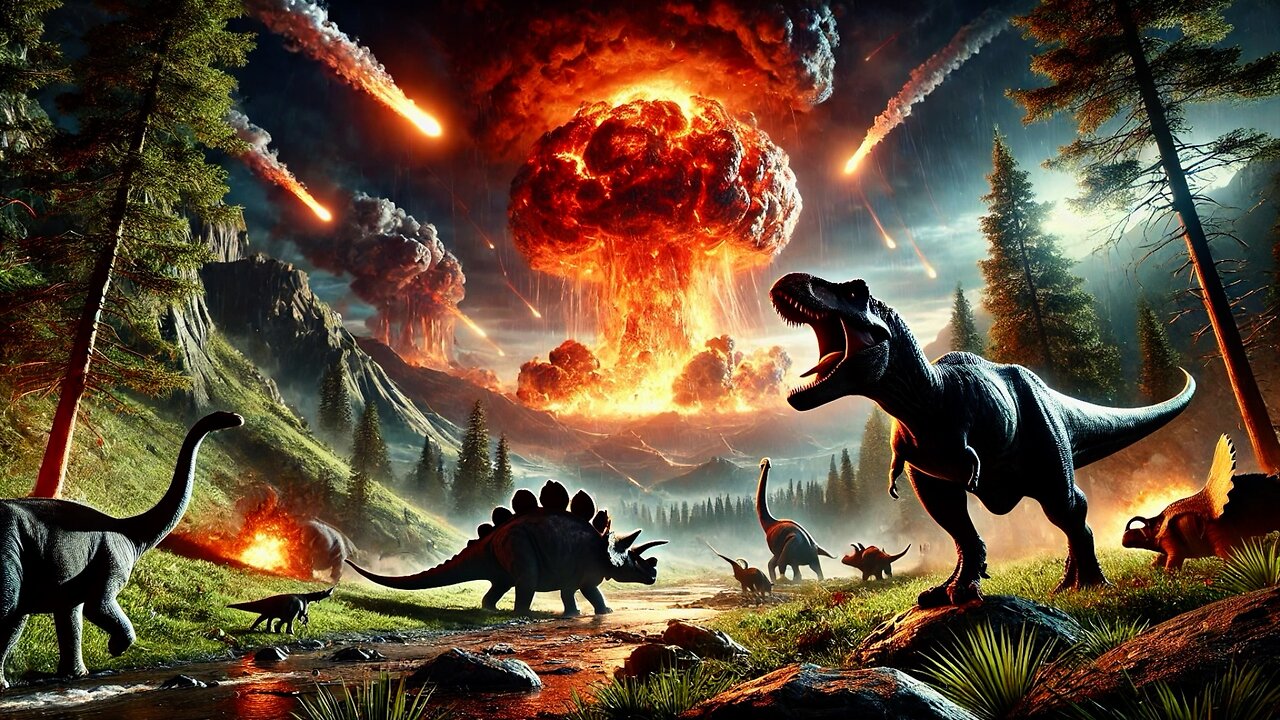Premium Only Content

Dinosaur Apocalypse - The Asteroid Strike That Changed The World - Full Documentary
Sixty-five million years ago the last of the non-avian dinosaurs went extinct. So too did the giant mosasaurs and plesiosaurs in the seas and the pterosaurs in the skies. Plankton, the base of the ocean food chain, took a hard hit. Many families of brachiopods and sea sponges disappeared. The remaining hard-shelled ammonites vanished. Shark diversity shriveled. Most vegetation withered. In all, more than half of the world's species were obliterated.
What caused this mass extinction that marks the end of the Cretaceous and the beginning of the Paleogene? Scientists have yet to find an answer. The one that does must explain why these animals died while most mammals, turtles, crocodiles, salamanders, and frogs survived. Birds escaped. So did snails, bivalves, sea stars (starfish), and sea urchins. Even hardy plants able to weather climate extremes fared OK.
Scientists tend to huddle around one of two hypotheses that may explain the Cretaceous extinction: an extraterrestrial impact, such as an asteroid or comet, or a massive bout of volcanism. Either scenario would have choked the skies with debris that starved the Earth of the sun's energy, throwing a wrench in photosynthesis and sending destruction up and down the food chain. Once the dust settled, greenhouse gases locked in the atmosphere would have caused the temperature to soar, a swift climate swing to topple much of the life that survived the prolonged darkness.
Asteroid or Volcanoes?
The extraterrestrial impact theory stems from the discovery that a layer of rock dated precisely to the extinction event is rich in the metal iridium. This layer is found all over the world, on land and in the oceans. Iridium is rare on Earth but it's found in meteorites at the same concentration as in this layer. This led scientists to postulate that the iridium was scattered worldwide when a comet or asteroid struck somewhere on Earth and then vaporized. A 110-mile-wide (180-kilometer-wide) crater carved out of Mexico's Yucatán Peninsula, called Chicxulub, has since been found and dated to 65 million years ago. Many scientists believe the fallout from the impact killed the dinosaurs.
But Earth's core is also rich in iridium, and the core is the source of magma that some scientists say spewed out in vast, floodlike flows that piled up more than 1.5 miles (2.4 kilometers) thick over 1 million square miles (2.6 million square kilometers) of India. This bout of volcanism has also been dated to about 65 million years ago and would have spread the iridium around the world, along with sunlight-blocking dust and soot and greenhouse gases.
Both hypotheses have merit. Some scientists think both may have contributed to the extinction, and others suggest the real cause was a more gradual shift in climate and changing sea levels. Regardless of what caused the extinction, it marked the end of Tyrannosaurus rex's reign of terror and opened the door for mammals to rapidly diversify and evolve into newly opened niches.
#jurassicworld #ancienthistory #historyfacts
-
 19:56
19:56
Knowledge Land
2 months agoU.S. SPACE FORCE - Orbital & Electromagnetic Warfare - Mission Objectives
691 -
 LIVE
LIVE
Matt Kohrs
9 hours agoHUGE Earnings Beat, Inflation Data & New Record Highs || Live Trading Options & Futures
583 watching -
 LIVE
LIVE
Tucker Carlson
31 minutes agoTony Aguilar Details the War Crimes He’s Witnessing in Gaza
1,779 watching -
 LIVE
LIVE
Wendy Bell Radio
5 hours agoBurn Baby Burn
5,339 watching -
 LIVE
LIVE
JuicyJohns
51 minutes ago🟢#1 REBIRTH PLAYER 10.2+ KD🟢$500 GIVEAWAY SATURDAY!
214 watching -
 LIVE
LIVE
LFA TV
11 hours agoLFA TV ALL DAY STREAM - THURSDAY 7/31/25
7,734 watching -
 1:02:45
1:02:45
Game On!
17 hours ago $1.55 earnedFootball is BACK! NFL Hall of Fame Game 2025
9.4K -
 LIVE
LIVE
FusedAegisTV
22 hours ago3rd Party Partner Showcase Nintendo Direct! REACTION 7.31.2025 | FusedAegis Presents
163 watching -
 13:30
13:30
WhaddoYouMeme
17 hours ago $3.59 earnedIt All Makes Sense Now
11.6K21 -
 2:00:05
2:00:05
Nick Freitas
16 hours agoIs Conservatism Dead?
12.8K20